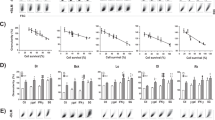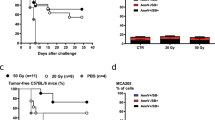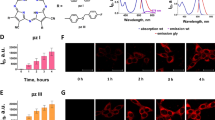Abstract
Hyperthermia and photoactivated hematoporphyrin derivative induce a dose-dependent reduction in the expression of the p250 surface melanoma-associated antigen on the human FME cell line. Expression of this glycoprotein antigen was quantitated by immunofluorescence flow cytometry based on the monoclonal antibody 9.2.27. Decrease in antigen expression was followed by a transient increase above the level for untreated cells, before normalization occurred about one week after treatment. These treatment-induced changes in antigen expression could partly be explained by changes in protein synthesis. This conclusion was based on the following observations: Hyperthermia and photoactivated hematoporphyrin derivative both inhibited protein synthesis. The latter increased again rapidly to rates above normal until antigen expression reached normal level, whereupon the protein synthesis rate decreased to normal. Inhibition of protein synthesis by cycloheximide 1 day after heating, prevented the recovery of antigen expression, demonstrating that protein synthesis is necessary for resumption of normal antigen expression. The changes in both antigen expression and protein synthesis were dose-dependent, and the magnitude and duration of the changes increased with increasing dose. The time courses of the changes in protein synthesis after two different treatments which both inactivated two logs of cells were almost identical, as were the time courses after two lower heat doses inactivating one log of cells. These similarities were reflected in the changes in antigen expression. At the same time as protein synthesis reached its maximum and antigen expression resumed normal level, an increase in the Golgi apparatus was observed ultrastructurally, indicating an increased synthesis rate and transportation of glycoproteins to the cell surface.
This is a preview of subscription content, access via your institution
Access options
Subscribe to this journal
Receive 24 print issues and online access
$259.00 per year
only $10.79 per issue
Buy this article
- Purchase on Springer Link
- Instant access to full article PDF
Prices may be subject to local taxes which are calculated during checkout
Similar content being viewed by others
Author information
Authors and Affiliations
Rights and permissions
About this article
Cite this article
Davies, C., Ranheim, T., Malik, Z. et al. Relationship between changes in antigen expression and protein synthesis in human melanoma cells after hyperthermia and photodynamic treatment. Br J Cancer 58, 306–313 (1988). https://doi.org/10.1038/bjc.1988.209
Issue Date:
DOI: https://doi.org/10.1038/bjc.1988.209



